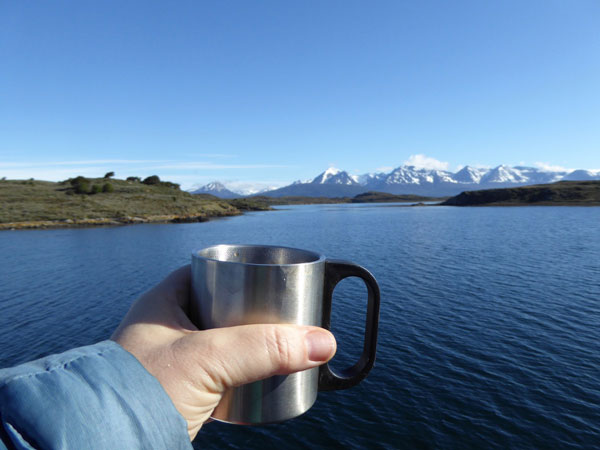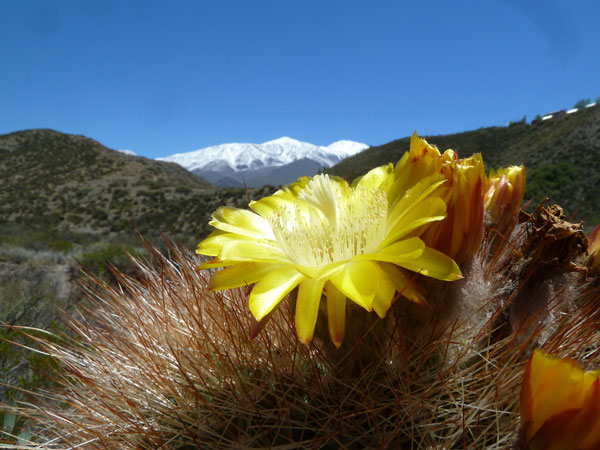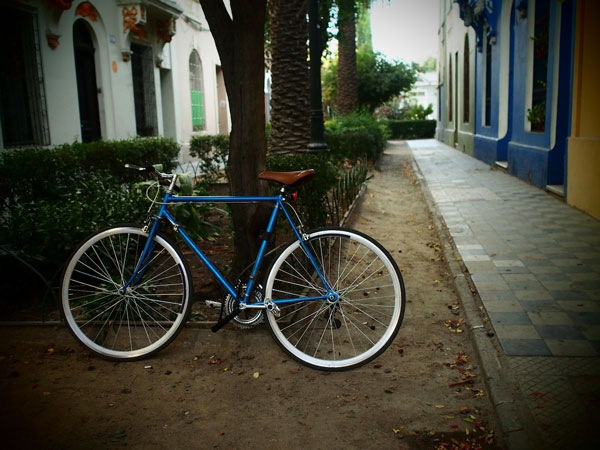Hey kids, put your grammar hats on, because it’s time to talk about verb endings in Chilean Spanish (and friends beseeching male friends to not have that baby right then and there, but that comes at the end, skip ahead if you have a short attention span).
Sure, you’ve got your copy of 501 Spanish Verbs, fully conjugated handy right there, right? That’s a great place to rest your coffee while we take a second to expound upon just one more verb ending in Chilean Spanish that won’t show up in your hefty tome, or any other verions of those fancy G-is for grammar books. No weí, you say? yes, way.
In Chilean Spanish, you will often hear the greeting (among friends or peers)
Cómo estaí?
Or if someone wants to know where you (familiar) live, they will say,
Dónde vivís?
Wikipedia probably says it better but more boringly than I do, and without hilarious anecdotes here:
So basically, you got your -ar verb. Instead of using the regular tú form which would be -as, you instead use an aí. Cachai? (got it?) Like that. This yeilds conversations such as the following one I had with my students after a bike accident left me unable to lift my left arm.
No te dieron cabestrillo? (Didn’t they give you a sling?)
Sipo (well, yes)
Y por qué no lo ocupaí? (And why aren’t you using it?)
I was so touched by their kindness in worry about my arm, and by their decision to use this funny little affectionate Chilean verb ending that I may have been extra generous on their oral quiz, even to the guy who spoke in a frightening word salad. And not a composed one. Or maybe it was more a merenjunje (concoction).
In the case of an -er or -ir verb, where you would normally get an -es ending, instead it’s an -ís ending, changing the stress of the verb as well as the pronunciation, though the s is generally dropped, so instead of “qué haces?” you’ll get “qué hacís” which sounds like K-ah-C.
The voseo is very affectionate and informal, and usually goes on words that are comun y corriente (normally used). For example, with the somewhat formal word inculcular (which means indoctrinate or infuse someone with ideas), I would be surprised to hear someone say, y por qué no lo inculcaí? ? It shows up probably most commonly on the most common verbs like hacer, ir, cachar and huevear (this requires a whole ‘nother post about this crazy word, huevón, and that was the joke about no weí from above, which means, don’t d… around.
As foreigners, we can use these forms or not (in the right time and place), and everyone will fall all over themselves about how Chilean we sound. I have friends who do, and friends who don’t. I tend to, but I am a linguistic chameleon. If you leave me with your Dutch grandmother for a week, I promise to accidentally pick up some of her accent or grammatical inconsistencies sin querer (without meaning to).
But this funny little voseo, as they call it (though we tend to use it with tú, and seldom use vos unless we’re pretending to be Argentine, and even then we will start with a che more often than we end with a vos) also has a funny side. Oh, a very funny side. So funny, in fact that I almost choked on the water I was drinking out of my new Camelbak water bladder the other day (go camelbak and hydrapak for being interchangeable water-bladder wise, you make me very happy).
I was on this zany overnight bikeride that I like to do every year. Like to do may be a great exaggeration, but there I was, out on my bike, about 60 km down, and another 60 to go, in the middle of a very black and breezy night, and we were pedaling up this long slow hill, and one guy shouted to another (you need some background here, parar is to stop, and parir is to give birth).
No te parís!!!!
Though this, is, in fact, the correct voseo conjugation of parar, for the command, it doesn’t work for the negative command, which reverts back to the regular voseo “paraí.” His friend was telling him not to stop, that much was obvious, though it was grammatically muddled. Unfortunately for him, “No parís” (without the te) means “don’t give birth!” with this form, which is how we all parsed it. It was late, and we were tired.
I wasn’t the only one who heard it, and we entertained ourselves silly, a Chilean amiga of mine and I as we pedaled up past the thousands of blinking lights of the other people headed towards the sanctuary where people go to light candles, say prayers, ask for grace and maybe even a miracle or two.
Which, not to be blasphemous, is a real shame that he did not, in fact give birth right then and there. Because that would have been a miracle. But stopping on that hill? No weí.
Photos to follow.










Great post. I've never really had this whole grammatical point explained to me. I looked up that wikipedia article too and now I feel like I understand it. Will wonders never cease?
Thanks Sara, I'm an irreperable language geek, so it doesn't surprise me that I just heard it and kind of got it. You probably have better things to do!
Great post (sorry for the reperition). For some reason, unbeknownst to even me, it kind of bugs me that it is called "voseo". Is that toally illogical?
Art thou sure about that thou art saying?
Are je sure to?
El voseo no es un fenomeno exclusivo del español… ha ocurrido y sigue ocurriendo en muchos idiomas, donde la segunda persona singular (tú, thou) es reemplazada por la segunda persona plural (vosotros -vos-, je -you-).
Ello ocurre generalmente cuando ocurre una desiguanldad en la conversación, en que el hablante debe dirigirse a un oyente con "mayor rango o alcurnia"…
Es un tema muy entretenido, y puede averiguarse mucho sobre él buscando en Google "grammar t-v distinction".
en cuanto al voseo en Chile, tiene un par de características particulares:
-se ocupa indistintamente usando tú o vos (ej: tú tienes, vos tenís).
-el voseo chileno hace desaparecer la E de la terminación clásica española, a diferencia del argentino que hace desaparecer la I
Ej: vosotros tenéis (español clásico)
vos tenés (español argentino)
vos tenís (español chileno)
El tema da para largo…
Saludos.
Annje, I always liked the word voseo. It was like I could play an instrument, you know, the voseo. I'm also a fan (word and fact) of leísmo.
Y César, estoy mas que segura de lo que escuché, y como lo entendí, aparte de eso, bueno ya sabes, tanto tiempo en Chile que el chamullo me sale muy facilmente.
El voseo argentino igual parece tener otras características las cuales siempre me suenan raras, como el cambio de siéntate a sentáte. Capaz si hubiese seguido estudiando la linguistica ya sabría porque. Aunque estudié la linguistica teórica, cosa bastante inutil en este ambito.
Y por si acaso, cuál de los Césares eres tú?
I like the word voseo, and even the concept of voseo, but for some reason I don't like that they call what happens in Chilensis voseo–it just doesn't seem like a voseo to me, but linguists seem to disagree with me on that.
I also like the word leísmo, but don't like the practice much–I am more into separating le's and lo's
Hilarious post! I love how you can write about the most mundane things (ok, voseo isn't mundane, but still) & make them so entertaining.
It's fascinating to learn about the differences between Chilean & Argentine voseo. I knew some of this before, but I guess I always assumed the -ai endings are just an abbreviation, sort of, not a full grammatical pattern. So this is really interesting.
And of course back here in the US hardly anyone even knows what voseo is … sometimes I just want to say "vos sos" and not get weird looks for it!
Annje, and that would be because you probably speak Spanish from a more academic perspective than I do. I studied it in high school. Pero me manejo igual, y les sorprende a cada rato a los chilenos pues no me va tan mal! Or is that los sorprende? The first time I saw lo used to refer to a person I put my hand up to my mouth in mock shock!
And Elisa, I'm glad to have you along for the ride, and glad you enjoyed it! You know, some people do fish friday or outnabout thursday. I could do boring grammatical topic wednesday. Now, please, no one go stealing my fabo idea. Or at least if you do, please be even more hilarious about it than I'd have been. Thanks!
fabulous. Also, the use of the pronoun "vos" instead of "tú" in Chilean voseo is considered coarser. You'll hear it used by the masculine set amongst themselves. Its usage is also tied to social class (much more likely to hear a woman say vos instead of tú in Lo Espejo than in El Golf).
I don't know if it's academic, I think the le/lo thing is because I learned most of my SPanish in countries where theya re both used and so I was extra conscious of it. Did you learn in Spain?
y te manejas?? your Spanish is awesome–I heard you on that interview you posted some time back–I believe you when you say you are a chameleon!
oooh, blushing. How fun! I still make mistakes, probably always will. There are students that have accuracy, and those who have fluency. Great ones will have both, and I'm mostly on the fluency tip, from what I can see!
I studied Spanish in high school for three years, and then I've traveled a bit, and then lived here. It's funny, though I could pick up on how the voseo works, I still haven't been able to zero in on the le/lo, which is why I overuse le.
Thanks for chiming in, Carerica! I have used vos to be rude to someone, but I never really thought about it as a class thing. Like if someone piropos me on the street and says, mijita rica cómo estás? and I find it really gross, I might say, "bien, y vos?" But a) I'm sure you're right and b) since you're in Argentina right now I'm sure you've noticed the differences. BTW, when are you back in Chile? Might be high time we met up!
hehehe, funny post. no te parís, hehehehehe.
Great topic and interesting comments. I did not realize the voseo was it's own grammatical structure.
I thought Chileans had just taken the vosotros form and cut off the "otros" to end up with "vos" and then altered the vosotros verb as well.
vosotros habláis
vos hablái
vosotros coméis
vos comís
vosotros vivís
vos vivís
I had no idea it was like the "thou". Interesting.
Therefore this:
"Vos soi terzible de pollo po weon."
would translate as this:
"Thou art terrible of chicken well dude."
hehehehe
saludos
Thanks for the insight!
What a great resource!